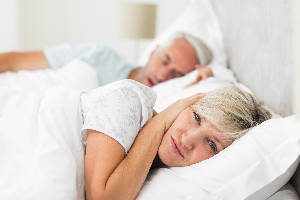The American Sleep Apnea Association says that loud persistent snoring, followed by cessation of breathing lasting over 10 seconds, is abnormal. Dr. Eric Buck and Dr. Hannah Burton, dentists at Distinctive Smiles of Ohio, agree. They screen patients for Obstructive and Central Sleep Apnea, partnering with sleep physicians in treatment of this serious health problem.
Types of sleep apnea
There are 3 kinds of sleep apnea:
- Obstructive Sleep Apnea, or OSA, where the soft tissues at the back of the throat collapse during the night or even during daytime naps. Airway obstruction, startling awake, gasping for breath and loud snoring result.
- Central Sleep Apnea, or CSA, a more serious sleep disorder in which the brain does not tell the person to breathe.
- Mixed Sleep Apnea which combines characteristics of OSA and CSA
Only a sleep physician can correctly diagnose sleep apnea. He or she makes a diagnosis based on symptoms and on monitored, in-office sleep studies where breathing patterns and vital signs are monitored.
While adults and children of all ages suffer from sleep apnea, some factors pre-dispose some individuals to the problem. They are:
- Age. The 40 to 60 age group seems prone.
- Gender. More men than women have sleep apnea.
- Large neck circumference
- Obesity
- Family history
- Smoking
- Alcohol abuse
- Sinus problems
Why sleep apnea is harmful
Sleep apnea sometimes causes relationship problems as spouses or roommates experience disrupted sleep due to loud snoring. From the physical side, people with sleep apnea seem prone to diabetes, stroke, hypertension, daytime drowsiness, mood swings, headaches and attention and memory difficulties. In short, snoring is nothing to ignore.
That’s why Drs. Buck and Burton, Dublin, OH dentists, evaluate patients with 2 written questionnaires–both aimed at understanding if snoring is really sleep apnea. The brief questionnaires–the STOP-Bang Questionnaire and the Epworth Sleepiness Scale–tell the doctors if a patient requires referral to a sleep physician for further evaluation.
What can help
For more serious forms of sleep apnea, physicians may prescribe Continuous Positive Airway Pressure. These CPAP machines deliver a steady flow of air via a facial mask. Worn every time the patient sleeps, CPAP forces the airway open so breathing is continuous. Additionally, some patients need surgery to remove excess soft tissue in the throat or to add devices to stiffen and stabilize the palate.
Less serious OSA may be treated with a custom-fitted “snore guard” from Distinctive Smiles of Dublin, Ohio. Made from acrylic, this mouth-guard holds the lower jaw in a more forward position so the airway remains open. Many times, this is all a patient needs to get a good night’s sleep.
Do you snore?
A member of the American Academy of Dental Sleep Medicine, Dr. Eric Buck stresses the importance of understanding how oral health impacts sleep and systemic health. If you snore, or your spouse says you do, speak to Dr. Buck or Dr. Burton, and get evaluated. You and your loved ones will sleep better and your overall functioning and well-being will improve, too. Contact Distinctive Smiles of Dublin today for a personal consultation.

